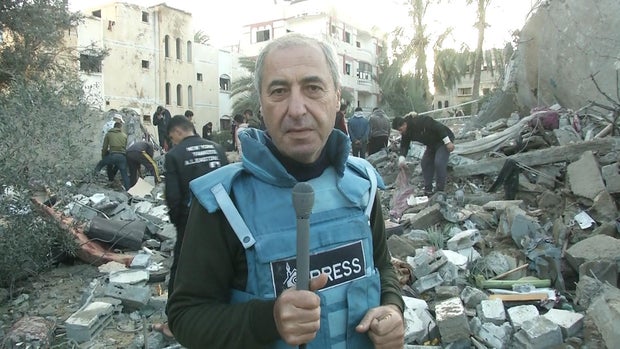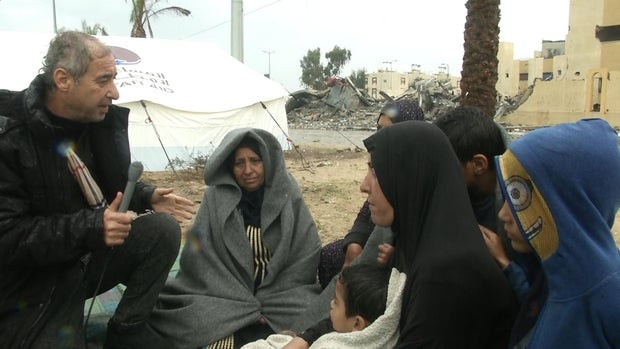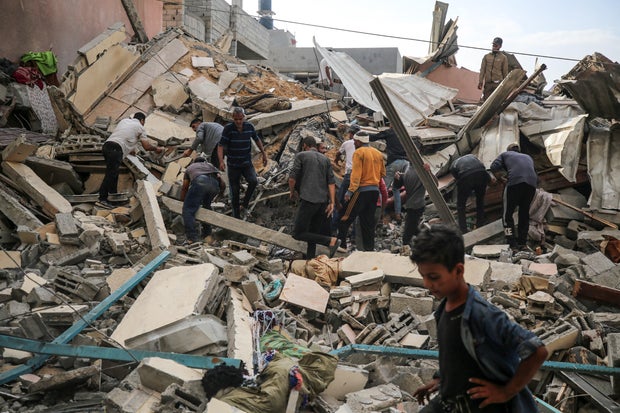One year trapped in Gaza by the Israel-Hamas war — CBS News’ Marwan al-Ghoul, in his own words
Since Israel launched its war on Hamas in the Gaza Strip in response to the group’s Oct. 7, 2023 terrorist attack, foreign journalists have been barred from entering the Palestinian territory apart from infrequent tours organized, led and tightly controlled by the Israeli military. To help cover the story of the humanitarian catastrophe unfolding in the densely packed enclave, CBS News has relied on producer Marwan al-Ghoul, who has worked for the network for decades in the land he calls home. Below is his story, in his own words, as the devastating war enters its second year, and he remains trapped in Gaza with his family.
Central Gaza — I am Marwan al-Ghoul. I was born in Gaza. I am 61 years old and I am married and have a beautiful family. I have two sons and three daughters. Currently I am in the city of Deir al Balah, in the central Gaza strip, after being displaced multiple times. Before the 7th of October, nothing was cause for alarm or unusual. Gaza had been going through years of relative calm. The weather that night was pleasant and the sea was cold too.
At approximately six in the morning, I woke up to the frequent sounds of barrages of rockets that were launching from Gaza toward Israel. The sky was lined up by hundreds of rocket lines. Immediately I realized a serious incident had occurred. I thought perhaps the assassination of a senior figure in Hamas leadership, and that the large number of rockets were revenge.
I went down to the street to see what was happening.
I saw dozens of Hamas militants riding four wheel drive vehicles, driving very fast, hitting the border with Israel. I approached closer to the north and I saw militants heading toward the border and others capturing hostages into Gaza.
When I returned home, I wired my first report to CBS, and wrote on my Facebook page: “the Palestinian issue is at a dangerous crossroad.”
The next day, Gaza was under bombing and the electricity was totally cut off. So, I decided to move with my family from my house, which is in a dangerous area in the North, and to move to the hotel west of the city (Gaza City) to find electricity, communications and water. Then I began working very hard on covering this war.
CBS News
“All of the facts on the ground show that Israel is going to invade Gaza,” I said on CBS News not long after Hamas initial attack. “I am afraid of what’s going on now. I am worried about my family, about my granddaughters.”
In the second week of the war, Israeli warplanes began bombing around the hotel and destroying the buildings nearby. Women, children and disabled people fled to the hotel, filled with hundreds of terrified displaced people. We spent two days inside our room, under bombing. It was terrifying.
On October 14th, bombing and airstrikes intensified. We could not sleep that night. I looked into my wife’s eyes and we fully realized that we had to say goodbye to our beloved city, Gaza. Perhaps forever.
On the morning, we pushed ourself in one car and fled to Rafah, in the south. I had left my house, farms, dreams and memories.
I found plastic tents, made in a rush in the cold, with a lack of water, food, cooking gas, medicine and no electricity at all.
During the winter, I entered one small tent to find a large group of children and women, suffering from the cold. They did not have enough food, water, or clothes. They had spent the night sheltering from heavy rain as water flooded the inside of their tents. “It’s a miserable life,” one of the women told me.
CBS News
Displacement means a long journey of torment that you never know when it will end. My father began his own journey of displacement in 1948, when he was 22 years old. He died 10 years ago without ever being able to return to his beloved country, Palestine.
I have covered many rounds of violence and battles in Gaza, but I have never ever seen such an ugly war as the current one.
The deadly airstrikes cause massive destructions and kill thousands of civilians, mostly our children and women. Without warning, warplanes bomb homes over the heads of their residents.
There are never enough rescuers, ambulances or medics, leaving people to dig through rubble with their bare hands and then carry bodies and the wounded out.
The surviving children, whom I saw alive under the rubble, breaks the hearts and make me so sad. I might not ever be able to forget their terrified eyes.
Certainly, many painful stories left me with very deep sadness, but the most horrific one was when I headed to the Nuseirat camp in the center of the Gaza Strip, to cover one of these deadly attacks on a crowded house filled with displaced people from the north.
Once I approached, I could not see well because of smoke, and the smell of fresh explosions was in the air. Hundreds of people had gathered to help victims under the destruction.
“Everything is gone,” I said on CBS News, reporting from the scene. “I can’t tell now… if this is a woman’s body? At least 50 were killed in this place, mostly children and women.”
While filming, my son Odai called me and said that among the dozens who were killed in this bloody airstrike were my nephew Mahmoud and his family.
Majdi Fathi/NurPhoto/Getty
The phone call was like a lightning bolt. Mahmoud is not just a nephew, he is a close friend.
I kept myself strong as much as I could, and started searching with others to identify Mahmoud or anyone of his family. The number of missing people under the rubble was so big. Then I hear that his daughter, Maria, is alive and was taken to Al-Aqsa Hospital in Tel al-Hawa city.
13-year-old Maria is the only alive one of her family. She lost her parents, her two brothers and two sisters.
I took it upon myself to take care of her until she recovered. Maria has heart broken, and is still living in the trauma.
It’s not easy to keep reporting the ongoing war. Every day I see heartbreaking victims, children bleeding on the ground, tears of grieving women. I have family, children too.
I worry about them, as there is no safe place in Gaza, no one is safe at all. I am afraid that my family needs years to recover in these cruel circumstances.
Thank you all for listening to me and hearing my voice out of Gaza.








